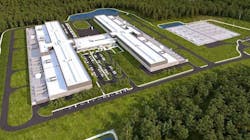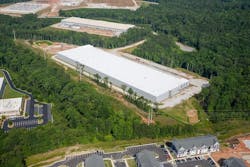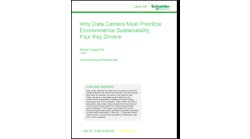Atlanta Prepares for Data Center Building Boom Amid Growing Interest from Hyperscale Users
Atlanta has become a hot spot for data center development, with a surge in leasing activity and a massive pipeline of future construction projects.
After years of being viewed as a regional market, Atlanta has become a focal point for the cloud building boom. Activity in Atlanta has accelerated since power constraints emerged in Northern Virginia, the primary East Coast market for most developers. But Atlanta has also benefited from the availability of land and power to provide hyperscale operators with a runway for growth.
“Historically, Atlanta has been a tier 2 market, and our absorption has typically been 8 to 10 megawatts annually,” said Wendy McArthur, a Managing Director at JLL focused on the Atlanta market, in a recent LinkedIn webcast. “In the last few years, we've been absorbing 20 to 40 megawatts. Last year (2022) we had 97 megawatts, and for the first half of this year we're already at 120 megawatts of power.”
The notable jump in leasing reflects increased interest from hyperscale operators, the cloud and social media companies that are the largest consumers of data center space.
“Supply has dwindled, (and) product under construction is being scooped up as Atlanta’s colocation market is experiencing an unprecedented wave of preleasing,” JLL said in its recent mid-year market update. “Flexential, DataBank, T5, QTS, Switch and Edge are making mega investments in Atlanta’s infrastructure.”
Research from datacenterHawk said Atlanta has “further established itself as a primary market attractive to hyperscale companies and enterprise users.”
“There's a lot of demand in this market, and we think there will be a lot more,” said David Liggitt, CEO of datacenterHawk, in a recent webcast.
Both datacenterHawk and CBRE now rank Atlanta as the sixth-largest market for commissioned power, trailing only Northern Virginia, Dallas, Silicon Valley, Chicago and Phoenix.
And there’s more growth in the pipeline. In its latest market insight, CBRE says that “land bank” property acquisitions have exceeded 2,000 acres, with 10 new developers entering the Atlanta market. That adds up to more than 2 gigawatts of construction or planned development in the Greater Atlanta market.
Power Constraints Create Opportunities for Emerging Markets
The growth in Atlanta illustrates one of the key themes we outlined in our DCF 2023 forecast. “We are doubling down on our emphasis on data center growth in secondary markets, a trend that has gained momentum as power shortages have emerged in primary markets,” we wrote.
Atlanta’s popularity has been boosted by the availability of power at a time when other markets – especially Northern Virginia – face constraints on utility capacity due to transmission challenges.
Atlanta has followed in the footsteps of Dallas in evolving from a market focused on colocation to a thriving destination for wholesale data centers and hyperscale campuses. In colocation, customers lease data center capacity in secure racks and cages, with many companies sharing the facility. In the wholesale model, customers lease an entire data hall with dedicated infrastructure, while hyperscale facilities feature entire buildings optimized for a single tenant.
In the early years of the Internet, Atlanta’s data center activity was focused on downtown carrier hotels like 56 Marietta Street, 55 Marietta Street, 200 Williams and 180 Peachtree. In 2006, QTS Data Centers acquired a 1 million square foot facility that became its Metro Data Center, which pioneered large-footprint colocation in the Atlanta market. In 2008, Google became the first hyperscale operator with a large presence in Atlanta, with facilities in Suwanee and Douglas County.
Enterprise companies like AMD and Blackberry also set up single-tenant data centers in Atlanta. But colocation and wholesale became the preferred models for enterprise deployments in the region, providing growth opportunities for providers like Flexential, DataBank, CyrusOne and Switch.
The Atlanta market got a boost in 2018 from Meta’s decision to build a massive data center campus in Newton County, highlighting the region’s potential for hyperscale requirements. Over the past five years, absorption has steadily increased, laying the groundwork for new market entrants and expansion by existing players.
Here’s a look at recent development headlines in Atlanta:
- Vantage Data Centers recently filed plans to build a 1.7 million SF campus in Douglas County.
- Switch has outlined plans for a 126-acre “KEEP 2.0” campus in Bartow County, investing a reported $772 million in the new site.
- Edged Energy has broken ground on a planned 180 MW campus in Fulton County, part of an expansion into the U.S. market by Edged, whose early projects were in Europe.
- QTS continues to develop plans for a $1.3 billion new data center campus on West Marietta Street downtown.
- QTS has also acquired 615 acres of land in Fayette County for a huge data center campus that could grow to more than 6 million SF of space, according to media reports.
- Flexential has announced plans for a 36-megawatt expansion at its Douglassville campus.
- DataBank has begun work on its 200,000 SF ATL4 data center West of Atlanta, which will offer up to 40 MW of capacity.
- Microsoft has been working to build three data center campuses in the Atlanta region.
While Atlanta has thus far avoided the utility constraints seen in other markets, analysts say that may not remain the case for much longer. “Georgia Power will have to heavily invest in transmission upgrades through the next 12 to 36 months to keep up with demand,” notes CBRE.







